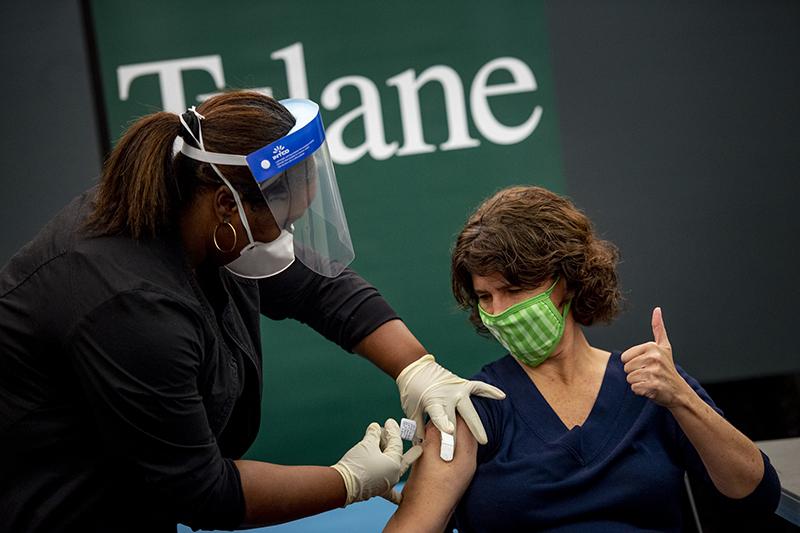Tulane University begins to administer COVID-19 vaccine to faculty, staff
On Tuesday, Tulane University began administering the first doses of the Pfizer/BioNTech COVID-19 vaccine to faculty, staff and students eligible under the state’s current guidelines.
About 50 Tulanians were vaccinated on the first day at the J. Bennett Johnston Building, said Joe Esneault, chief clinical data officer for Tulane University Medical Group. In the upcoming days, hundreds more are expected to be vaccinated. Second doses will follow in three weeks.
PHOTOS: Vaccine rollout at Tulane University
The first dose went to physician Marius Commodore, MD, whose work as the medical director of Tulane Campus Health puts him in close contact with infected students.
“It has a little bit of a historic feel because so many people had a terrible year,” Commodore said of being in the first wave of vaccinations.
Physicians, nurses and other frontline healthcare workers who work at Tulane hospitals received the Pfizer vaccine starting in December. The state recently expanded eligibility for faculty, staff and students of allied health schools who work with others in the New Orleans community. Based on those guidelines, Tulane is initially vaccinating faculty, staff and students of the schools of Medicine, Public Health and Tropical Medicine, and Social Work; Campus Health staff; and frontline food service and custodial/operations staff, as well as employees over 70 years of age.
Esohe Adun, who works in Dining Services in the School of Medicine cafeteria, said she received the vaccine notice and scheduled an appointment for the same day, but only after serious consideration and even discussion with her co-worker. She said she wanted to encourage other Tulanians and New Orleanians to get the vaccine as well.
“I think it’s very important for them to do it. There’s nothing to worry about,” Adun said. “It helps the community. We’re all ready to get back to normal.”
Latricia Charles, who conducts COVID-19 testing at the Downtown Living Well Clinic, comes in contact with COVID-19-infected individuals multiple times a week. The vaccine is reassuring to her, she said. But she, too, gave the opportunity a lot of thought beforehand.
“I was a little apprehensive about it, too, as I am sure is the case for many,” she said. “The one thing that really gave me the courage to say, ‘Yes, I will get it,’ is that my mom, who works in the Emergency Department at University Medical Center [New Orleans], has gotten this same vaccination and is doing fine, so that gives me hope.”
Microbiologist Lisa Morici, PhD, whose research at the School of Medicine in part involves adjuvants for COVID-19 vaccines, said she could understand why people may have reservations about the new vaccine. But “achieving herd immunity through vaccination is the best way to stop the pandemic,” she said.
“The safety of the vaccine is indisputable at this point,” she added. “The development of the vaccine in less than one year is a historic accomplishment, but it took many years of dedication, persistence and collaboration of scientists across the world to get us here … I have a tremendous feeling of gratitude for the scientists and engineers who labored for decades to improve and ultimately advance these vaccine platforms for rapid deployment against a global threat like COVID-19.”
Third-year medical student Jason Mathias said he was familiar with how the vaccine works and was even ready in case he experienced side effects after the second dose, which would be administered three weeks later.
Commodore, the Campus Health medical director, was also optimistic about the vaccine. Asked how he felt after the first dose, he replied, “It’s five minutes in; I still feel fine. Hopefully the rest of it is a non-event.”
For more information about signing up for the COVID-19 vaccine, see Tulane’s FAQ.

